Business Law Report: Legal Systems, Business Impacts and Solutions
VerifiedAdded on 2024/06/11
|23
|4660
|62
Report
AI Summary
This business law report provides an analysis of the UK legal system, including the sovereignty of Parliament and various sources of law such as legislation, precedents, customs, EU law, and the ECHR. It evaluates the role of government in law-making and the application of statutory and common law in justice courts, while also assessing the effectiveness of recent legal reforms. The report further illustrates the potential impact of company, employment, and contract law on businesses, using JPM Publishing as an example, and differentiates between regulations, legislation, and standards. It evaluates the legal system's effectiveness, discusses legal solutions to business problems, and recommends appropriate solutions based on alternative legal advice, concluding with a critical review of the use of legal solutions.
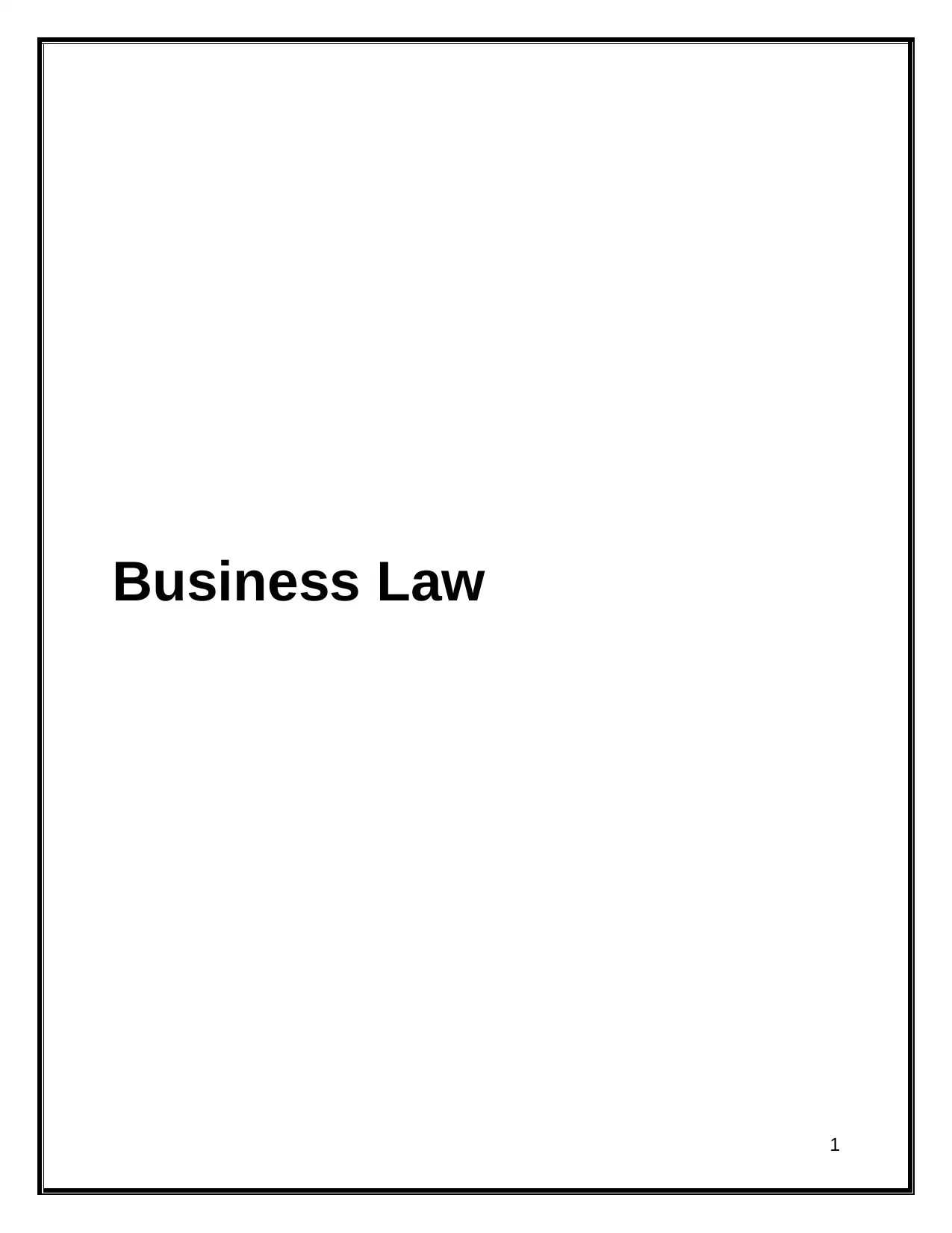
Business Law
1
1
Paraphrase This Document
Need a fresh take? Get an instant paraphrase of this document with our AI Paraphraser
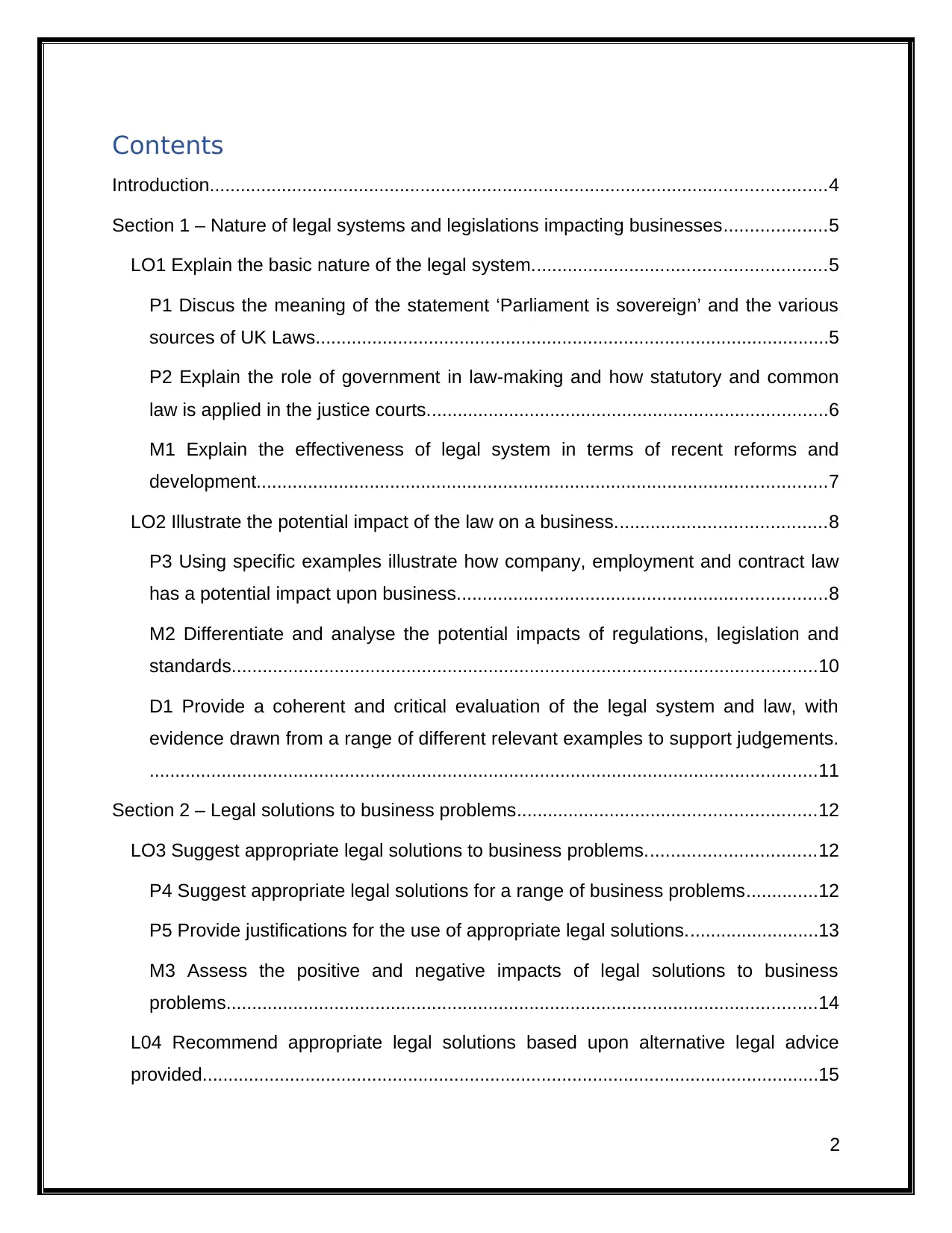
Contents
Introduction........................................................................................................................4
Section 1 – Nature of legal systems and legislations impacting businesses....................5
LO1 Explain the basic nature of the legal system.........................................................5
P1 Discus the meaning of the statement ‘Parliament is sovereign’ and the various
sources of UK Laws....................................................................................................5
P2 Explain the role of government in law-making and how statutory and common
law is applied in the justice courts..............................................................................6
M1 Explain the effectiveness of legal system in terms of recent reforms and
development...............................................................................................................7
LO2 Illustrate the potential impact of the law on a business.........................................8
P3 Using specific examples illustrate how company, employment and contract law
has a potential impact upon business........................................................................8
M2 Differentiate and analyse the potential impacts of regulations, legislation and
standards..................................................................................................................10
D1 Provide a coherent and critical evaluation of the legal system and law, with
evidence drawn from a range of different relevant examples to support judgements.
..................................................................................................................................11
Section 2 – Legal solutions to business problems..........................................................12
LO3 Suggest appropriate legal solutions to business problems.................................12
P4 Suggest appropriate legal solutions for a range of business problems..............12
P5 Provide justifications for the use of appropriate legal solutions..........................13
M3 Assess the positive and negative impacts of legal solutions to business
problems...................................................................................................................14
L04 Recommend appropriate legal solutions based upon alternative legal advice
provided........................................................................................................................15
2
Introduction........................................................................................................................4
Section 1 – Nature of legal systems and legislations impacting businesses....................5
LO1 Explain the basic nature of the legal system.........................................................5
P1 Discus the meaning of the statement ‘Parliament is sovereign’ and the various
sources of UK Laws....................................................................................................5
P2 Explain the role of government in law-making and how statutory and common
law is applied in the justice courts..............................................................................6
M1 Explain the effectiveness of legal system in terms of recent reforms and
development...............................................................................................................7
LO2 Illustrate the potential impact of the law on a business.........................................8
P3 Using specific examples illustrate how company, employment and contract law
has a potential impact upon business........................................................................8
M2 Differentiate and analyse the potential impacts of regulations, legislation and
standards..................................................................................................................10
D1 Provide a coherent and critical evaluation of the legal system and law, with
evidence drawn from a range of different relevant examples to support judgements.
..................................................................................................................................11
Section 2 – Legal solutions to business problems..........................................................12
LO3 Suggest appropriate legal solutions to business problems.................................12
P4 Suggest appropriate legal solutions for a range of business problems..............12
P5 Provide justifications for the use of appropriate legal solutions..........................13
M3 Assess the positive and negative impacts of legal solutions to business
problems...................................................................................................................14
L04 Recommend appropriate legal solutions based upon alternative legal advice
provided........................................................................................................................15
2
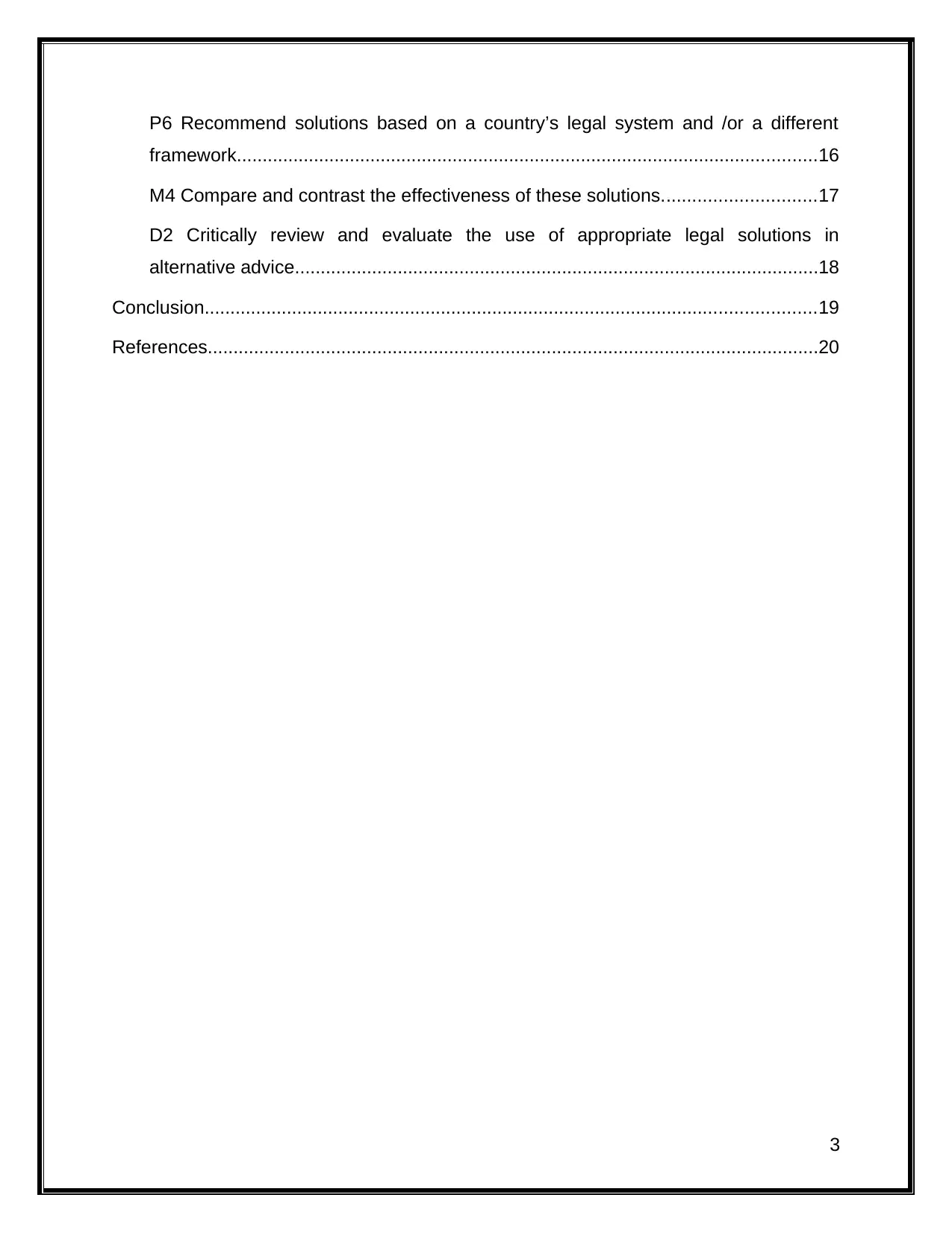
P6 Recommend solutions based on a country’s legal system and /or a different
framework.................................................................................................................16
M4 Compare and contrast the effectiveness of these solutions..............................17
D2 Critically review and evaluate the use of appropriate legal solutions in
alternative advice......................................................................................................18
Conclusion.......................................................................................................................19
References.......................................................................................................................20
3
framework.................................................................................................................16
M4 Compare and contrast the effectiveness of these solutions..............................17
D2 Critically review and evaluate the use of appropriate legal solutions in
alternative advice......................................................................................................18
Conclusion.......................................................................................................................19
References.......................................................................................................................20
3
⊘ This is a preview!⊘
Do you want full access?
Subscribe today to unlock all pages.

Trusted by 1+ million students worldwide
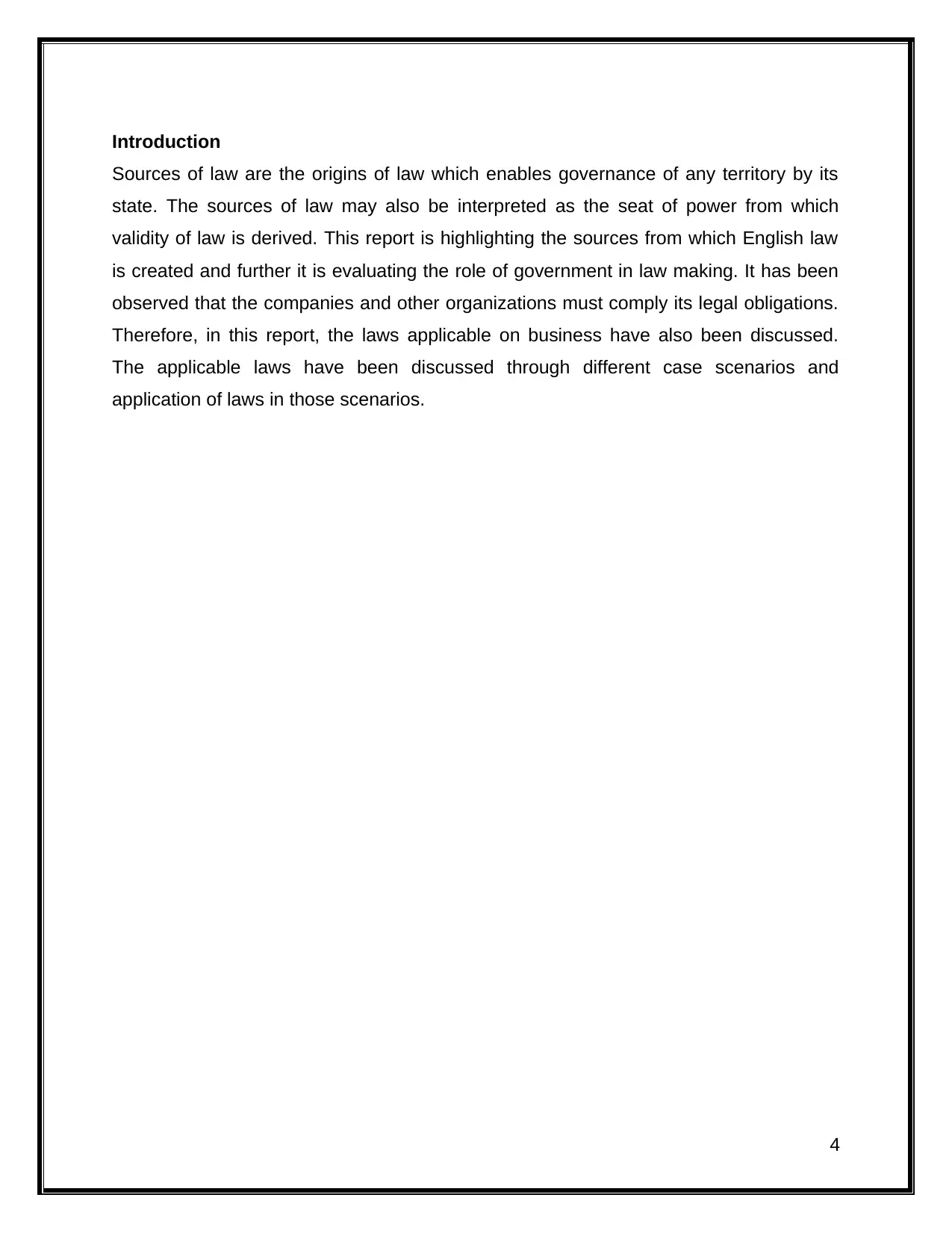
Introduction
Sources of law are the origins of law which enables governance of any territory by its
state. The sources of law may also be interpreted as the seat of power from which
validity of law is derived. This report is highlighting the sources from which English law
is created and further it is evaluating the role of government in law making. It has been
observed that the companies and other organizations must comply its legal obligations.
Therefore, in this report, the laws applicable on business have also been discussed.
The applicable laws have been discussed through different case scenarios and
application of laws in those scenarios.
4
Sources of law are the origins of law which enables governance of any territory by its
state. The sources of law may also be interpreted as the seat of power from which
validity of law is derived. This report is highlighting the sources from which English law
is created and further it is evaluating the role of government in law making. It has been
observed that the companies and other organizations must comply its legal obligations.
Therefore, in this report, the laws applicable on business have also been discussed.
The applicable laws have been discussed through different case scenarios and
application of laws in those scenarios.
4
Paraphrase This Document
Need a fresh take? Get an instant paraphrase of this document with our AI Paraphraser
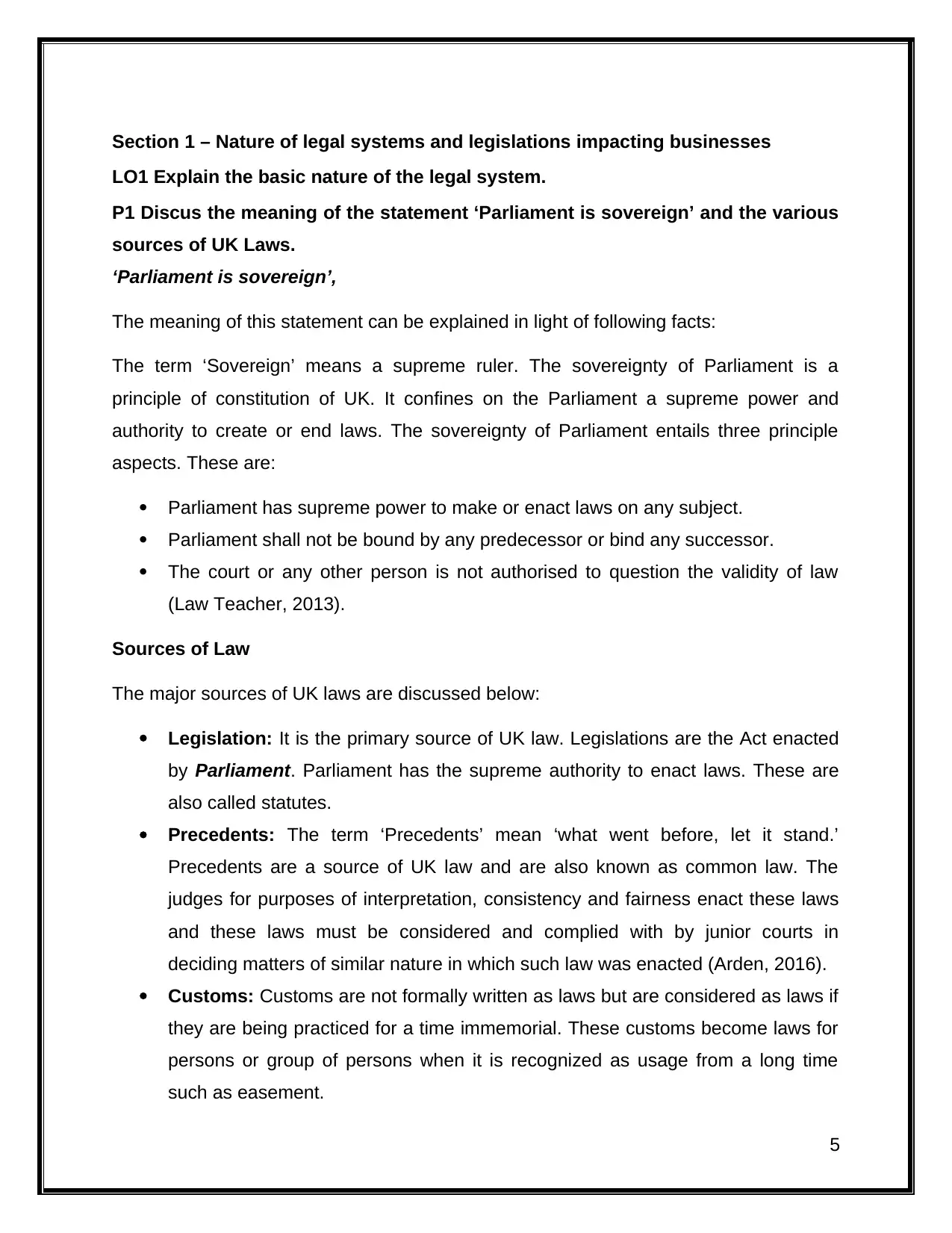
Section 1 – Nature of legal systems and legislations impacting businesses
LO1 Explain the basic nature of the legal system.
P1 Discus the meaning of the statement ‘Parliament is sovereign’ and the various
sources of UK Laws.
‘Parliament is sovereign’,
The meaning of this statement can be explained in light of following facts:
The term ‘Sovereign’ means a supreme ruler. The sovereignty of Parliament is a
principle of constitution of UK. It confines on the Parliament a supreme power and
authority to create or end laws. The sovereignty of Parliament entails three principle
aspects. These are:
Parliament has supreme power to make or enact laws on any subject.
Parliament shall not be bound by any predecessor or bind any successor.
The court or any other person is not authorised to question the validity of law
(Law Teacher, 2013).
Sources of Law
The major sources of UK laws are discussed below:
Legislation: It is the primary source of UK law. Legislations are the Act enacted
by Parliament. Parliament has the supreme authority to enact laws. These are
also called statutes.
Precedents: The term ‘Precedents’ mean ‘what went before, let it stand.’
Precedents are a source of UK law and are also known as common law. The
judges for purposes of interpretation, consistency and fairness enact these laws
and these laws must be considered and complied with by junior courts in
deciding matters of similar nature in which such law was enacted (Arden, 2016).
Customs: Customs are not formally written as laws but are considered as laws if
they are being practiced for a time immemorial. These customs become laws for
persons or group of persons when it is recognized as usage from a long time
such as easement.
5
LO1 Explain the basic nature of the legal system.
P1 Discus the meaning of the statement ‘Parliament is sovereign’ and the various
sources of UK Laws.
‘Parliament is sovereign’,
The meaning of this statement can be explained in light of following facts:
The term ‘Sovereign’ means a supreme ruler. The sovereignty of Parliament is a
principle of constitution of UK. It confines on the Parliament a supreme power and
authority to create or end laws. The sovereignty of Parliament entails three principle
aspects. These are:
Parliament has supreme power to make or enact laws on any subject.
Parliament shall not be bound by any predecessor or bind any successor.
The court or any other person is not authorised to question the validity of law
(Law Teacher, 2013).
Sources of Law
The major sources of UK laws are discussed below:
Legislation: It is the primary source of UK law. Legislations are the Act enacted
by Parliament. Parliament has the supreme authority to enact laws. These are
also called statutes.
Precedents: The term ‘Precedents’ mean ‘what went before, let it stand.’
Precedents are a source of UK law and are also known as common law. The
judges for purposes of interpretation, consistency and fairness enact these laws
and these laws must be considered and complied with by junior courts in
deciding matters of similar nature in which such law was enacted (Arden, 2016).
Customs: Customs are not formally written as laws but are considered as laws if
they are being practiced for a time immemorial. These customs become laws for
persons or group of persons when it is recognized as usage from a long time
such as easement.
5
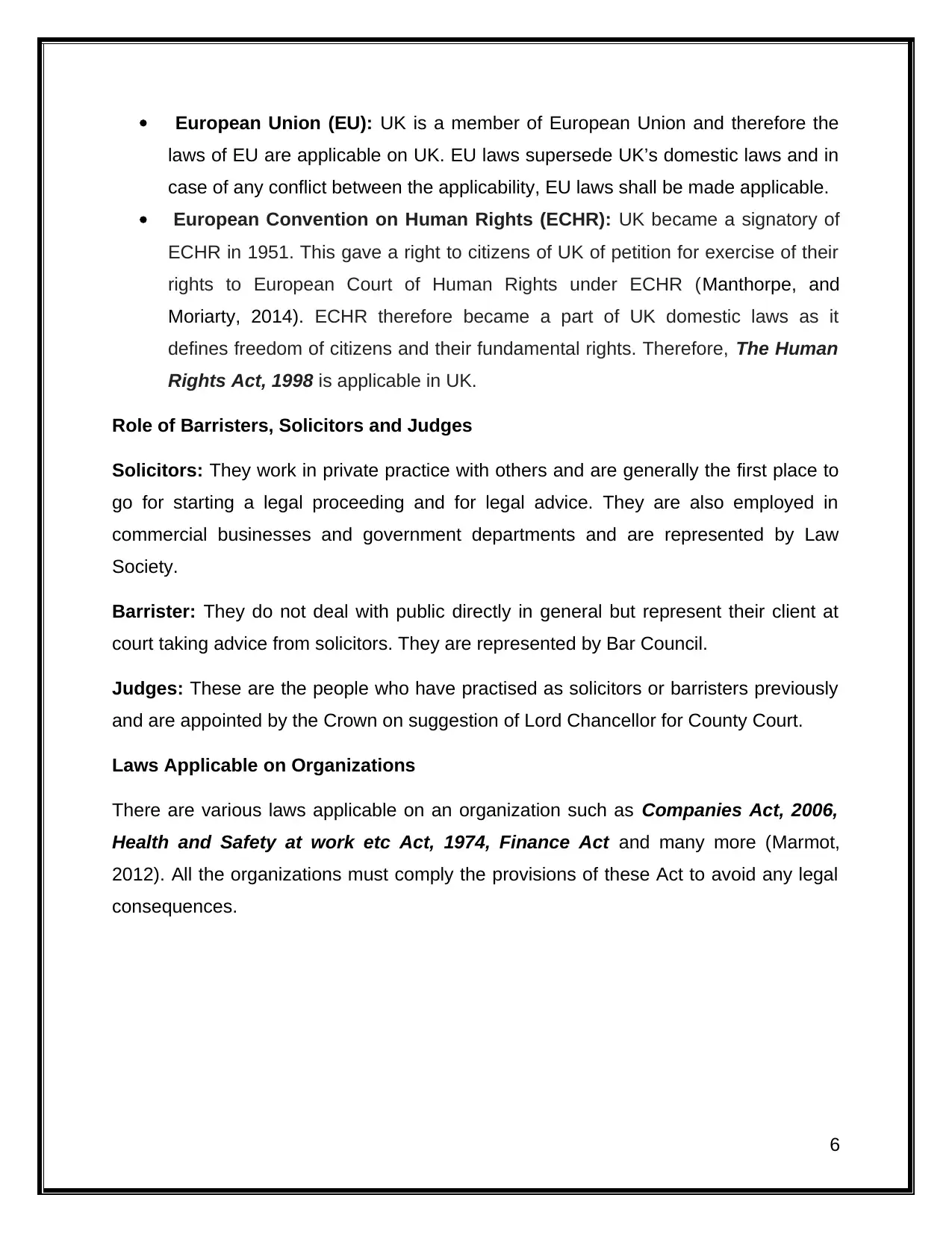
European Union (EU): UK is a member of European Union and therefore the
laws of EU are applicable on UK. EU laws supersede UK’s domestic laws and in
case of any conflict between the applicability, EU laws shall be made applicable.
European Convention on Human Rights (ECHR): UK became a signatory of
ECHR in 1951. This gave a right to citizens of UK of petition for exercise of their
rights to European Court of Human Rights under ECHR (Manthorpe, and
Moriarty, 2014). ECHR therefore became a part of UK domestic laws as it
defines freedom of citizens and their fundamental rights. Therefore, The Human
Rights Act, 1998 is applicable in UK.
Role of Barristers, Solicitors and Judges
Solicitors: They work in private practice with others and are generally the first place to
go for starting a legal proceeding and for legal advice. They are also employed in
commercial businesses and government departments and are represented by Law
Society.
Barrister: They do not deal with public directly in general but represent their client at
court taking advice from solicitors. They are represented by Bar Council.
Judges: These are the people who have practised as solicitors or barristers previously
and are appointed by the Crown on suggestion of Lord Chancellor for County Court.
Laws Applicable on Organizations
There are various laws applicable on an organization such as Companies Act, 2006,
Health and Safety at work etc Act, 1974, Finance Act and many more (Marmot,
2012). All the organizations must comply the provisions of these Act to avoid any legal
consequences.
6
laws of EU are applicable on UK. EU laws supersede UK’s domestic laws and in
case of any conflict between the applicability, EU laws shall be made applicable.
European Convention on Human Rights (ECHR): UK became a signatory of
ECHR in 1951. This gave a right to citizens of UK of petition for exercise of their
rights to European Court of Human Rights under ECHR (Manthorpe, and
Moriarty, 2014). ECHR therefore became a part of UK domestic laws as it
defines freedom of citizens and their fundamental rights. Therefore, The Human
Rights Act, 1998 is applicable in UK.
Role of Barristers, Solicitors and Judges
Solicitors: They work in private practice with others and are generally the first place to
go for starting a legal proceeding and for legal advice. They are also employed in
commercial businesses and government departments and are represented by Law
Society.
Barrister: They do not deal with public directly in general but represent their client at
court taking advice from solicitors. They are represented by Bar Council.
Judges: These are the people who have practised as solicitors or barristers previously
and are appointed by the Crown on suggestion of Lord Chancellor for County Court.
Laws Applicable on Organizations
There are various laws applicable on an organization such as Companies Act, 2006,
Health and Safety at work etc Act, 1974, Finance Act and many more (Marmot,
2012). All the organizations must comply the provisions of these Act to avoid any legal
consequences.
6
⊘ This is a preview!⊘
Do you want full access?
Subscribe today to unlock all pages.

Trusted by 1+ million students worldwide
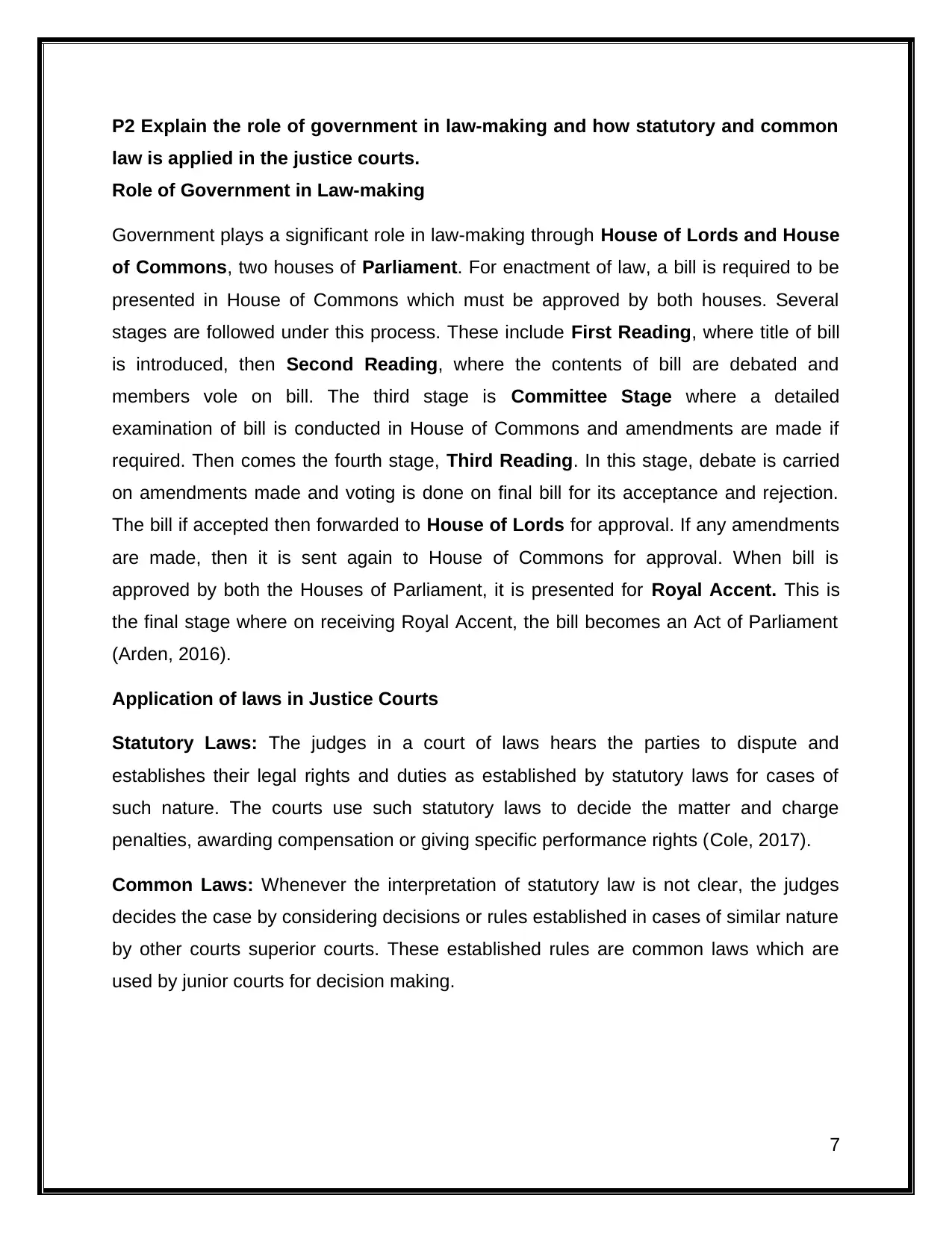
P2 Explain the role of government in law-making and how statutory and common
law is applied in the justice courts.
Role of Government in Law-making
Government plays a significant role in law-making through House of Lords and House
of Commons, two houses of Parliament. For enactment of law, a bill is required to be
presented in House of Commons which must be approved by both houses. Several
stages are followed under this process. These include First Reading, where title of bill
is introduced, then Second Reading, where the contents of bill are debated and
members vole on bill. The third stage is Committee Stage where a detailed
examination of bill is conducted in House of Commons and amendments are made if
required. Then comes the fourth stage, Third Reading. In this stage, debate is carried
on amendments made and voting is done on final bill for its acceptance and rejection.
The bill if accepted then forwarded to House of Lords for approval. If any amendments
are made, then it is sent again to House of Commons for approval. When bill is
approved by both the Houses of Parliament, it is presented for Royal Accent. This is
the final stage where on receiving Royal Accent, the bill becomes an Act of Parliament
(Arden, 2016).
Application of laws in Justice Courts
Statutory Laws: The judges in a court of laws hears the parties to dispute and
establishes their legal rights and duties as established by statutory laws for cases of
such nature. The courts use such statutory laws to decide the matter and charge
penalties, awarding compensation or giving specific performance rights (Cole, 2017).
Common Laws: Whenever the interpretation of statutory law is not clear, the judges
decides the case by considering decisions or rules established in cases of similar nature
by other courts superior courts. These established rules are common laws which are
used by junior courts for decision making.
7
law is applied in the justice courts.
Role of Government in Law-making
Government plays a significant role in law-making through House of Lords and House
of Commons, two houses of Parliament. For enactment of law, a bill is required to be
presented in House of Commons which must be approved by both houses. Several
stages are followed under this process. These include First Reading, where title of bill
is introduced, then Second Reading, where the contents of bill are debated and
members vole on bill. The third stage is Committee Stage where a detailed
examination of bill is conducted in House of Commons and amendments are made if
required. Then comes the fourth stage, Third Reading. In this stage, debate is carried
on amendments made and voting is done on final bill for its acceptance and rejection.
The bill if accepted then forwarded to House of Lords for approval. If any amendments
are made, then it is sent again to House of Commons for approval. When bill is
approved by both the Houses of Parliament, it is presented for Royal Accent. This is
the final stage where on receiving Royal Accent, the bill becomes an Act of Parliament
(Arden, 2016).
Application of laws in Justice Courts
Statutory Laws: The judges in a court of laws hears the parties to dispute and
establishes their legal rights and duties as established by statutory laws for cases of
such nature. The courts use such statutory laws to decide the matter and charge
penalties, awarding compensation or giving specific performance rights (Cole, 2017).
Common Laws: Whenever the interpretation of statutory law is not clear, the judges
decides the case by considering decisions or rules established in cases of similar nature
by other courts superior courts. These established rules are common laws which are
used by junior courts for decision making.
7
Paraphrase This Document
Need a fresh take? Get an instant paraphrase of this document with our AI Paraphraser
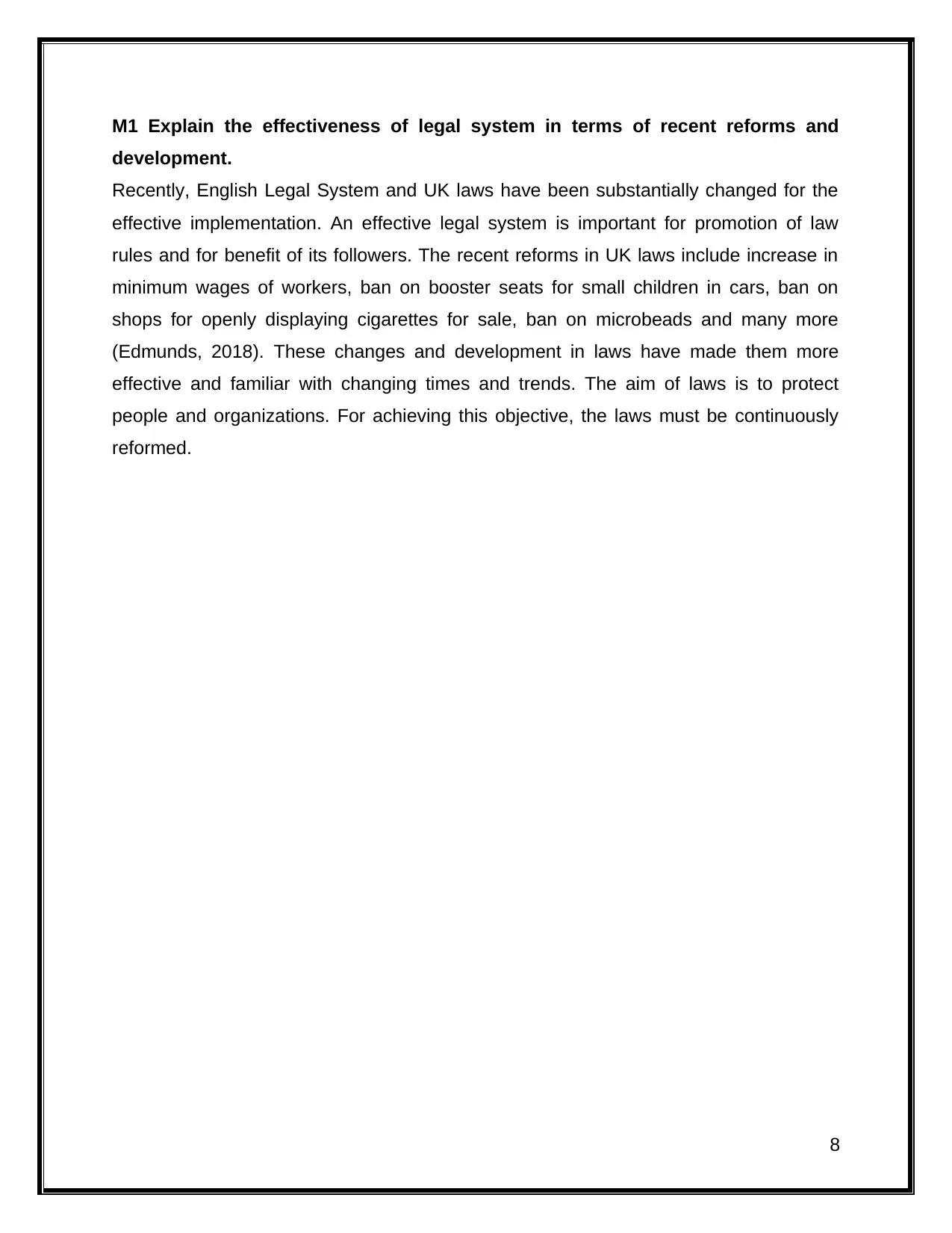
M1 Explain the effectiveness of legal system in terms of recent reforms and
development.
Recently, English Legal System and UK laws have been substantially changed for the
effective implementation. An effective legal system is important for promotion of law
rules and for benefit of its followers. The recent reforms in UK laws include increase in
minimum wages of workers, ban on booster seats for small children in cars, ban on
shops for openly displaying cigarettes for sale, ban on microbeads and many more
(Edmunds, 2018). These changes and development in laws have made them more
effective and familiar with changing times and trends. The aim of laws is to protect
people and organizations. For achieving this objective, the laws must be continuously
reformed.
8
development.
Recently, English Legal System and UK laws have been substantially changed for the
effective implementation. An effective legal system is important for promotion of law
rules and for benefit of its followers. The recent reforms in UK laws include increase in
minimum wages of workers, ban on booster seats for small children in cars, ban on
shops for openly displaying cigarettes for sale, ban on microbeads and many more
(Edmunds, 2018). These changes and development in laws have made them more
effective and familiar with changing times and trends. The aim of laws is to protect
people and organizations. For achieving this objective, the laws must be continuously
reformed.
8
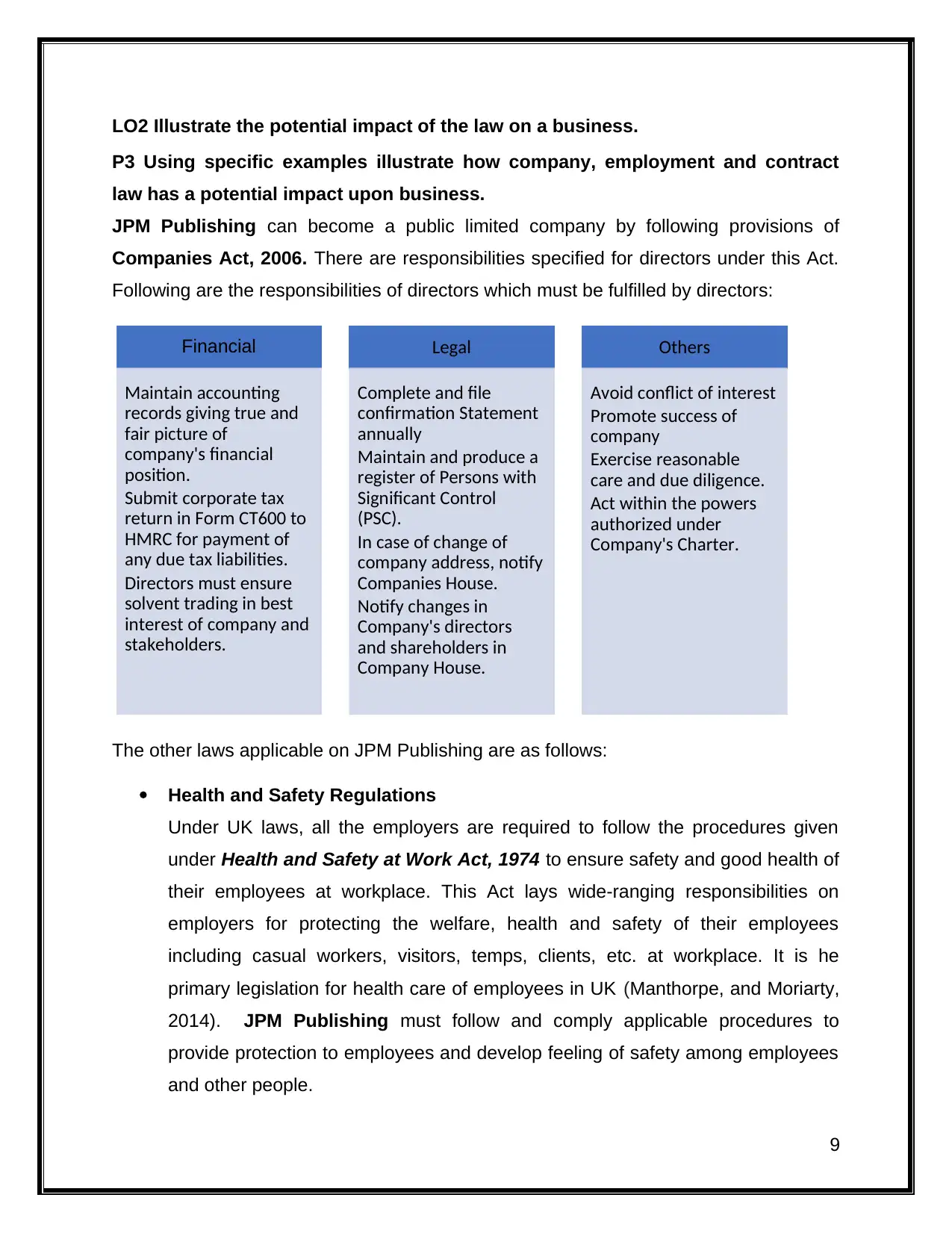
LO2 Illustrate the potential impact of the law on a business.
P3 Using specific examples illustrate how company, employment and contract
law has a potential impact upon business.
JPM Publishing can become a public limited company by following provisions of
Companies Act, 2006. There are responsibilities specified for directors under this Act.
Following are the responsibilities of directors which must be fulfilled by directors:
The other laws applicable on JPM Publishing are as follows:
Health and Safety Regulations
Under UK laws, all the employers are required to follow the procedures given
under Health and Safety at Work Act, 1974 to ensure safety and good health of
their employees at workplace. This Act lays wide-ranging responsibilities on
employers for protecting the welfare, health and safety of their employees
including casual workers, visitors, temps, clients, etc. at workplace. It is he
primary legislation for health care of employees in UK (Manthorpe, and Moriarty,
2014). JPM Publishing must follow and comply applicable procedures to
provide protection to employees and develop feeling of safety among employees
and other people.
9
Financial
Maintain accounting
records giving true and
fair picture of
company's financial
position.
Submit corporate tax
return in Form CT600 to
HMRC for payment of
any due tax liabilities.
Directors must ensure
solvent trading in best
interest of company and
stakeholders.
Legal
Complete and file
confirmation Statement
annually
Maintain and produce a
register of Persons with
Significant Control
(PSC).
In case of change of
company address, notify
Companies House.
Notify changes in
Company's directors
and shareholders in
Company House.
Others
Avoid conflict of interest
Promote success of
company
Exercise reasonable
care and due diligence.
Act within the powers
authorized under
Company's Charter.
P3 Using specific examples illustrate how company, employment and contract
law has a potential impact upon business.
JPM Publishing can become a public limited company by following provisions of
Companies Act, 2006. There are responsibilities specified for directors under this Act.
Following are the responsibilities of directors which must be fulfilled by directors:
The other laws applicable on JPM Publishing are as follows:
Health and Safety Regulations
Under UK laws, all the employers are required to follow the procedures given
under Health and Safety at Work Act, 1974 to ensure safety and good health of
their employees at workplace. This Act lays wide-ranging responsibilities on
employers for protecting the welfare, health and safety of their employees
including casual workers, visitors, temps, clients, etc. at workplace. It is he
primary legislation for health care of employees in UK (Manthorpe, and Moriarty,
2014). JPM Publishing must follow and comply applicable procedures to
provide protection to employees and develop feeling of safety among employees
and other people.
9
Financial
Maintain accounting
records giving true and
fair picture of
company's financial
position.
Submit corporate tax
return in Form CT600 to
HMRC for payment of
any due tax liabilities.
Directors must ensure
solvent trading in best
interest of company and
stakeholders.
Legal
Complete and file
confirmation Statement
annually
Maintain and produce a
register of Persons with
Significant Control
(PSC).
In case of change of
company address, notify
Companies House.
Notify changes in
Company's directors
and shareholders in
Company House.
Others
Avoid conflict of interest
Promote success of
company
Exercise reasonable
care and due diligence.
Act within the powers
authorized under
Company's Charter.
⊘ This is a preview!⊘
Do you want full access?
Subscribe today to unlock all pages.

Trusted by 1+ million students worldwide
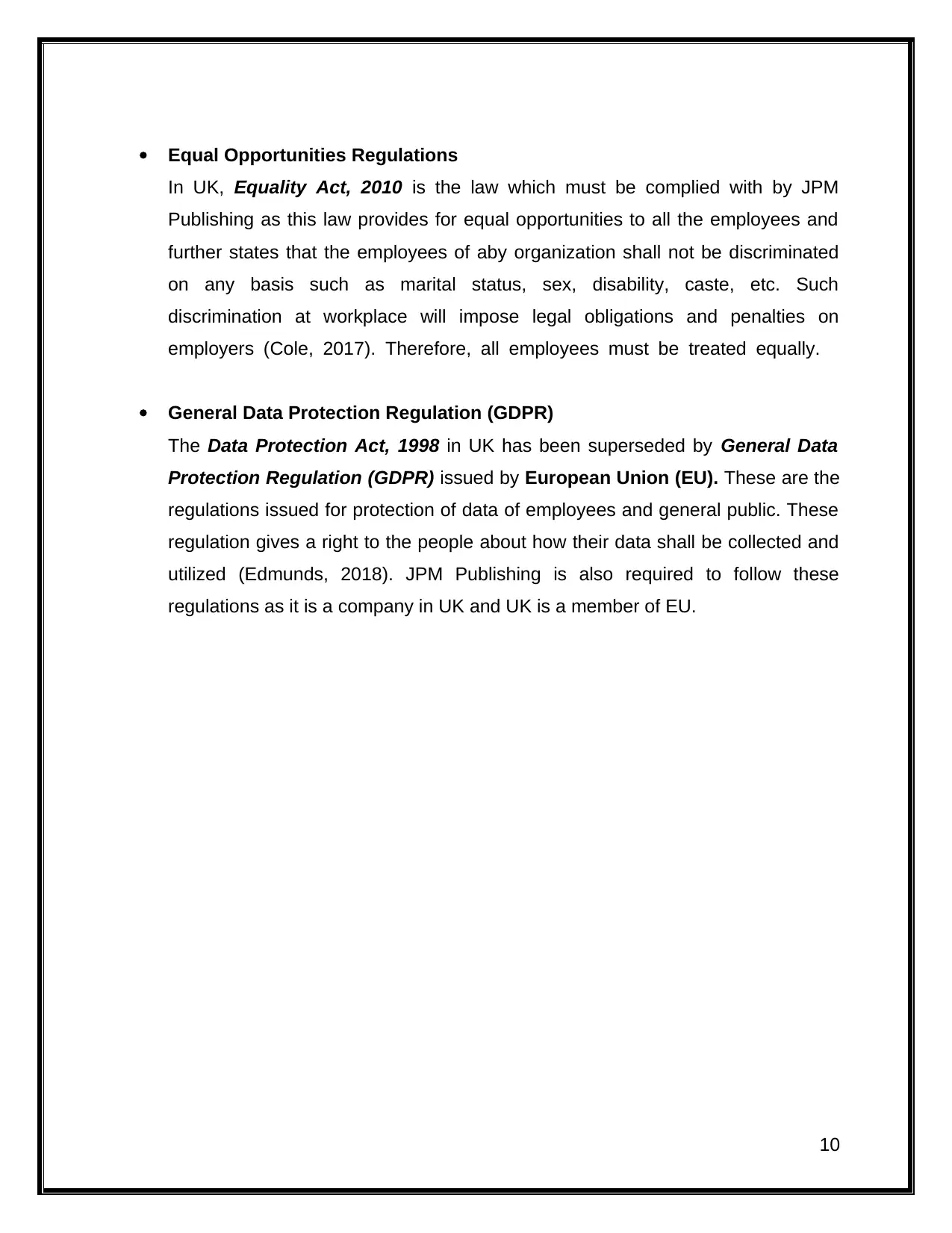
Equal Opportunities Regulations
In UK, Equality Act, 2010 is the law which must be complied with by JPM
Publishing as this law provides for equal opportunities to all the employees and
further states that the employees of aby organization shall not be discriminated
on any basis such as marital status, sex, disability, caste, etc. Such
discrimination at workplace will impose legal obligations and penalties on
employers (Cole, 2017). Therefore, all employees must be treated equally.
General Data Protection Regulation (GDPR)
The Data Protection Act, 1998 in UK has been superseded by General Data
Protection Regulation (GDPR) issued by European Union (EU). These are the
regulations issued for protection of data of employees and general public. These
regulation gives a right to the people about how their data shall be collected and
utilized (Edmunds, 2018). JPM Publishing is also required to follow these
regulations as it is a company in UK and UK is a member of EU.
10
In UK, Equality Act, 2010 is the law which must be complied with by JPM
Publishing as this law provides for equal opportunities to all the employees and
further states that the employees of aby organization shall not be discriminated
on any basis such as marital status, sex, disability, caste, etc. Such
discrimination at workplace will impose legal obligations and penalties on
employers (Cole, 2017). Therefore, all employees must be treated equally.
General Data Protection Regulation (GDPR)
The Data Protection Act, 1998 in UK has been superseded by General Data
Protection Regulation (GDPR) issued by European Union (EU). These are the
regulations issued for protection of data of employees and general public. These
regulation gives a right to the people about how their data shall be collected and
utilized (Edmunds, 2018). JPM Publishing is also required to follow these
regulations as it is a company in UK and UK is a member of EU.
10
Paraphrase This Document
Need a fresh take? Get an instant paraphrase of this document with our AI Paraphraser
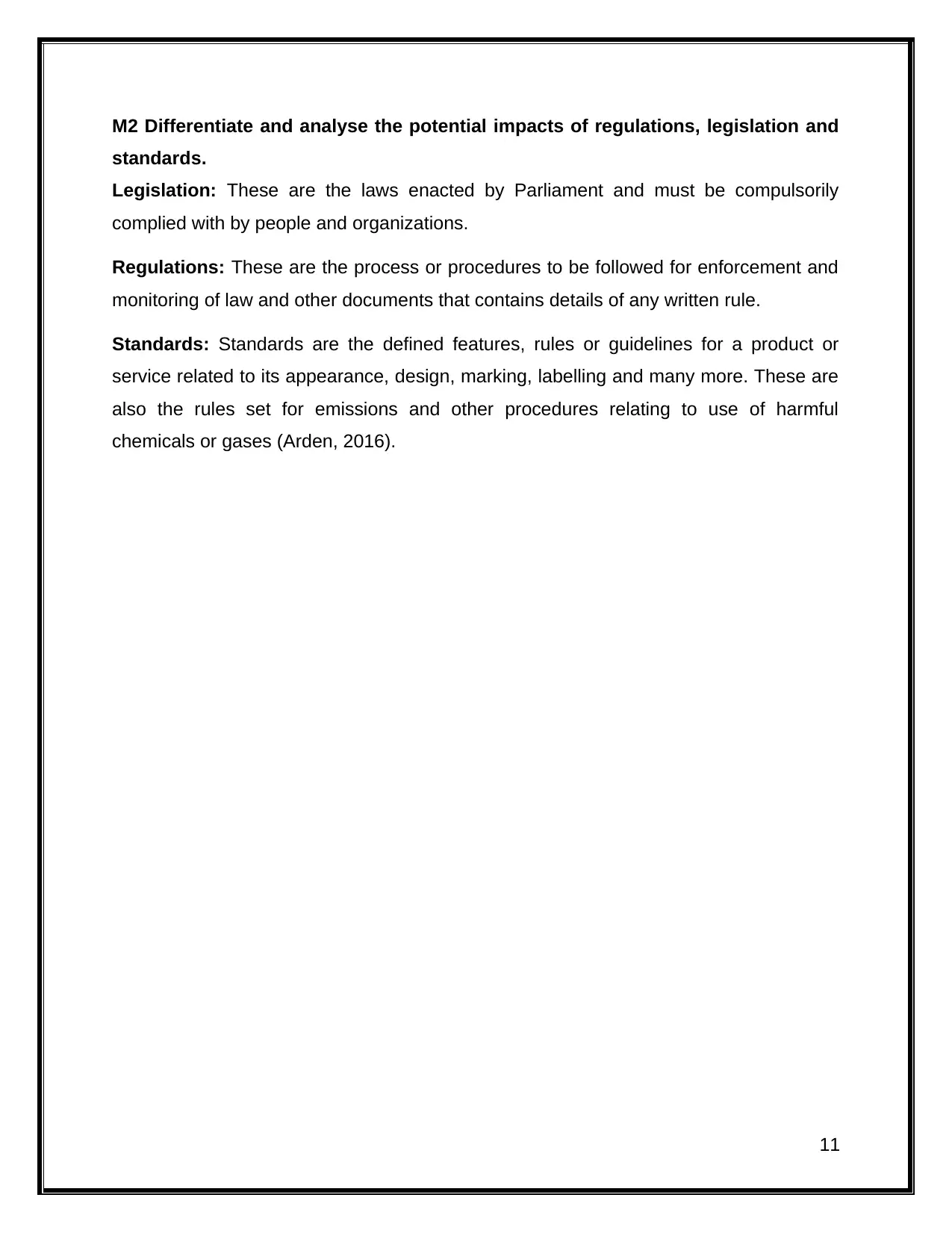
M2 Differentiate and analyse the potential impacts of regulations, legislation and
standards.
Legislation: These are the laws enacted by Parliament and must be compulsorily
complied with by people and organizations.
Regulations: These are the process or procedures to be followed for enforcement and
monitoring of law and other documents that contains details of any written rule.
Standards: Standards are the defined features, rules or guidelines for a product or
service related to its appearance, design, marking, labelling and many more. These are
also the rules set for emissions and other procedures relating to use of harmful
chemicals or gases (Arden, 2016).
11
standards.
Legislation: These are the laws enacted by Parliament and must be compulsorily
complied with by people and organizations.
Regulations: These are the process or procedures to be followed for enforcement and
monitoring of law and other documents that contains details of any written rule.
Standards: Standards are the defined features, rules or guidelines for a product or
service related to its appearance, design, marking, labelling and many more. These are
also the rules set for emissions and other procedures relating to use of harmful
chemicals or gases (Arden, 2016).
11
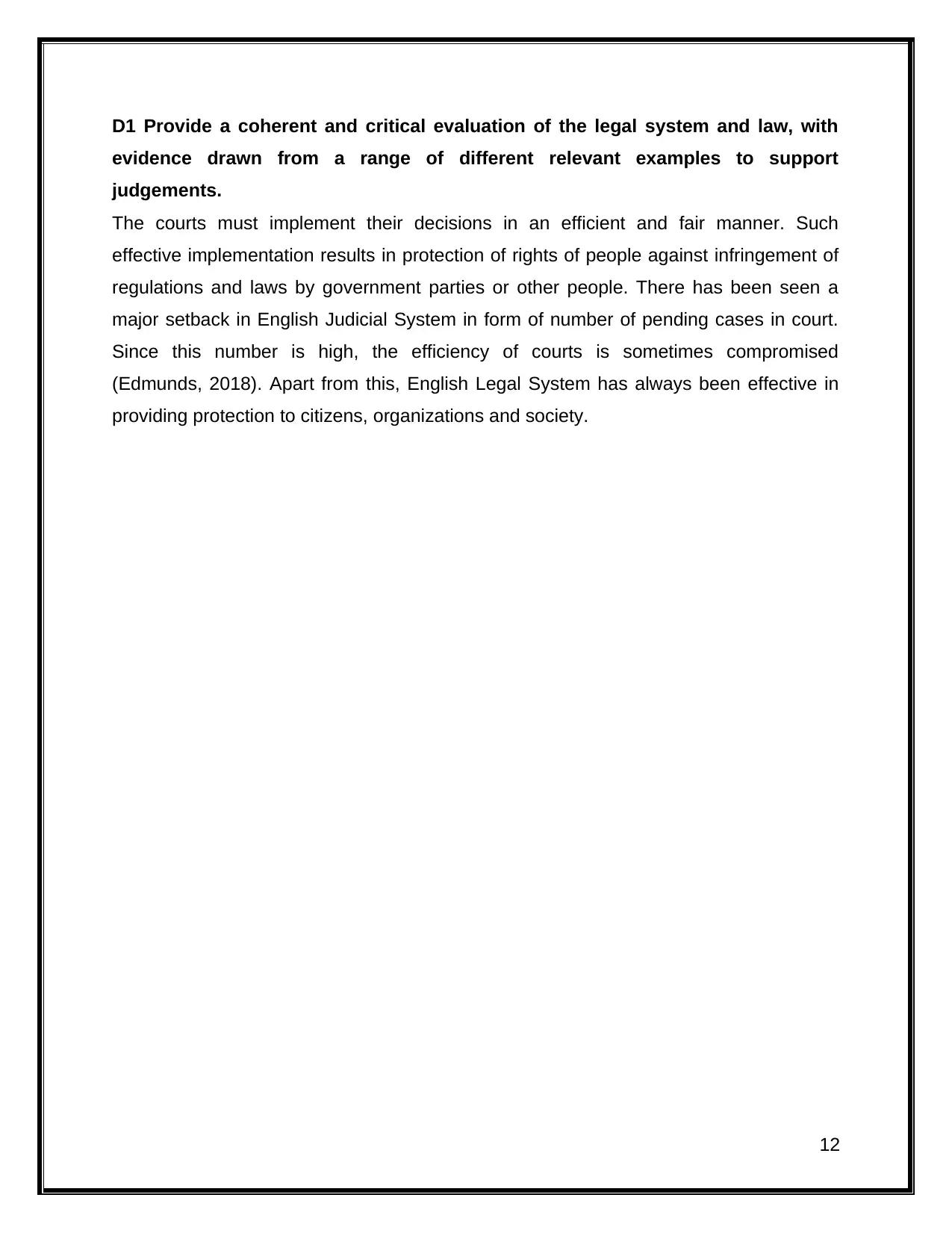
D1 Provide a coherent and critical evaluation of the legal system and law, with
evidence drawn from a range of different relevant examples to support
judgements.
The courts must implement their decisions in an efficient and fair manner. Such
effective implementation results in protection of rights of people against infringement of
regulations and laws by government parties or other people. There has been seen a
major setback in English Judicial System in form of number of pending cases in court.
Since this number is high, the efficiency of courts is sometimes compromised
(Edmunds, 2018). Apart from this, English Legal System has always been effective in
providing protection to citizens, organizations and society.
12
evidence drawn from a range of different relevant examples to support
judgements.
The courts must implement their decisions in an efficient and fair manner. Such
effective implementation results in protection of rights of people against infringement of
regulations and laws by government parties or other people. There has been seen a
major setback in English Judicial System in form of number of pending cases in court.
Since this number is high, the efficiency of courts is sometimes compromised
(Edmunds, 2018). Apart from this, English Legal System has always been effective in
providing protection to citizens, organizations and society.
12
⊘ This is a preview!⊘
Do you want full access?
Subscribe today to unlock all pages.

Trusted by 1+ million students worldwide
1 out of 23
Related Documents
Your All-in-One AI-Powered Toolkit for Academic Success.
+13062052269
info@desklib.com
Available 24*7 on WhatsApp / Email
![[object Object]](/_next/static/media/star-bottom.7253800d.svg)
Unlock your academic potential
Copyright © 2020–2026 A2Z Services. All Rights Reserved. Developed and managed by ZUCOL.




